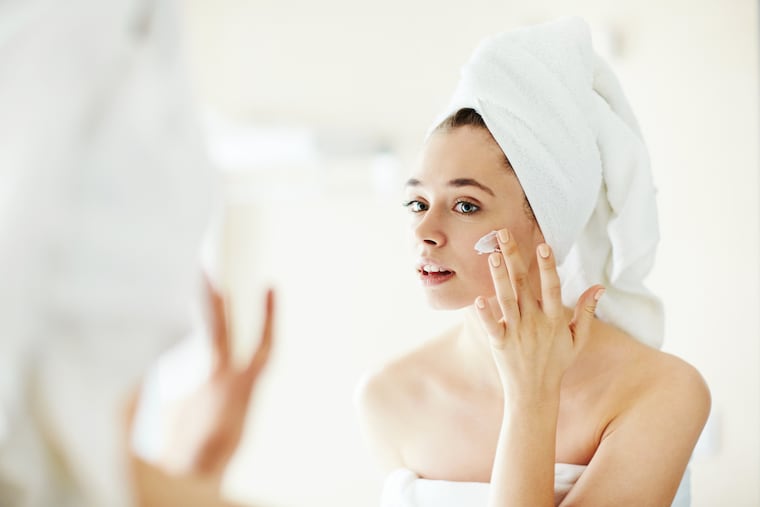Dermatologist says most skin-care products are kind of a scam
A dermatologist is here to tell you that taking care of your skin doesn’t need to be expensive or difficult.

Skin care is a huge, billion-dollar industry pervading our lives through advertising, television, YouTube tutorial videos, Internet forums -- you name it. Many of us constantly seek advice for how to better take care of our skin. Yet it seems as if we are always being up-sold to buy more and more products.
But what if I told you that most skin-care products aren’t necessary? What if, actually, you don’t need much of anything to have healthy skin?
I’m a dermatologist, and I’m here to tell you that most skin-care products are kind of a scam. Taking care of your skin doesn’t need to be expensive or difficult. The beauty industry plays upon our insecurities, superstitions, and our tendency to enjoy the complicated.
What’s the best skin care for this summer? How can I be natural and organic in taking care of my skin? What’s the best regimen for my skin?
While I understand where these questions come from, they’re based on false assumptions. Of course, if you have a skin condition like acne, eczema, or psoriasis, it’s wise to check in with either your primary care doctor or a dermatologist, as prescription medication and advice may be helpful. But for most of us, here is some simple advice.
Be cautious with sources of information on skin care. If you read an article that has links to products in it, you can safely ignore it (unless it is from a truly unbiased source, such as Consumer Reports). There is most likely a conflict of interest, as the source may be making money from your purchase of products, and these outlets are dependent on advertising revenue.
Notice that some articles rarely ask questions such as “Is toner even necessary?” Instead, they ask, “What’s the best toner that you should use?” as if the question of whether these products are necessary is already settled. Often these articles cite little research published in medical or science journals. Could it be because there is no good evidence that these products do much?
“But wait,” you might ask. “All the celebrities and beautiful people use these products, so why shouldn’t I?” Most beautiful people are beautiful despite, not because of, all the products they use. In fact, they are able to market things because of their beauty. Not to mention they present only their best selves to the public (and don’t forget about the wonders of Photoshop -- no product can mimic that tool). Actors, actresses, and models are successful and elevated with fame because of their genetic gifts. And, we can’t change our genetics (at least not yet).
This year the global skin-care industry is estimated to exceed $140 billion. Companies have every reason to persuade you to use multiple products that cost a lot of money. They will play on every insecurity you have. If there is a problem out there with nothing that will actually work and a company puts anything at all on the market claiming to fix it, people will buy it. Sure, by sheer chance and law of averages, some people will improve. That’s the case with Mederma, a popular gel that claims to reduce the appearance of scars and stretch marks. So many people have unsightly scars, and will try anything out there. However, there’s no good evidence Mederma (or any similar product) does anything to improve the look of scars or stretch marks. But people spend money on it anyway.
Here are my rules:
“Natural” products aren’t meaningfully different (don’t get me started on “gluten-free skin care”).
Moisturizers can be helpful for dry skin, but they don’t add much moisture themselves. If you use one, it’s important to apply it on wet skin (a.k.a. “soak and smear”) since moisturizers work by adding a layer to seal in water.
Be wary of products that claim to “fight aging.” The only creams that might help with wrinkles and sun damage are a prescription cream called Retin-A (tretinoin) or a similar product called Differin (adapalene) now available over-the-counter.
Don’t use apple cider vinegar or tea tree oil (both popular) for anything.
You don’t need to exfoliate. Your skin is a self-exfoliating organ.
So, what skin care do I recommend?
Sunscreen is essential to help prevent wrinkling and aging and protect against sunburn and skin cancer in light-skinned people.
Vaseline (the most known brand of petroleum jelly) is the best deal in skin care. It’s $5 a jar and it works great as a moisturizer, if your skin gets dry. Place it on skin or lips after moistening and it works great. The thickness and greasiness can be a turnoff, so you can use something with a different texture that, though no more effective, will set you back about $20 (for Aveeno) or more for fancy specialty products (e.g., Clinique, Kiehl’s).
That’s it. Keep in mind, skin-care products are luxury consumer goods. If they make you feel good about yourself or you like the way they feel, who am I to tell you not to use them? It’s your money. But just know that at a scientific level, almost nothing is better than a $5 jar of Vaseline.
Jules Lipoff, M.D., is assistant professor of dermatology at the University of Pennsylvania Perelman School of Medicine.